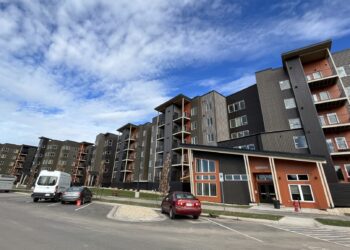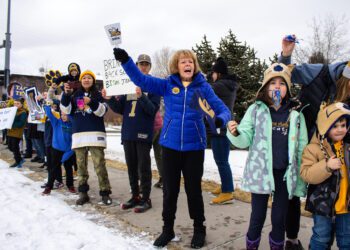Bills seeking to restrict cities’ ability to steer their communities toward renewable technology advance through the Capitol.
By Amanda Eggert MONTANA FREE PRESS
A trio of Republican-sponsored bills seeking to limit local governments’ ability to steer their communities toward renewable energies are advancing through the Montana Legislature, despite pushback from two of the state’s largest and fastest-growing cities.
Officials for Bozeman and Missoula, both of which have climate action policies, say legislative meddling will impede elected officials’ ability to carry out the wishes of their residents and jeopardize their ability to develop the kind of energy infrastructure and policies that appeal to many of the competitive, high-dollar businesses that power those local economies. Proponents maintain the pro-petroleum fuel and anti-solar energy bills will preserve consumer choice, keep costs associated with new construction down, and help Montana stay ahead of “ill-advised” trends in places like Eugene, Oregon, which is considering a ban on new residential “fossil fuel infrastructure.”
Sen. Jason Small, R-Busby, is sponsoring Senate Bill 228, which would prevent a local government from prohibiting the use or purchase of petroleum fuel sources, or the appliances and vehicles that burn them. It passed the Senate on March 2 and is awaiting a vote from the House Transportation Committee. Small, a boilermaker by trade, is also sponsoring Senate Bill 208, which seeks to prevent a local government from prohibiting or impeding the connection or reconnection of electric, natural gas or propane utility lines. It passed with all Republicans except Sen. Brad Molnar, R-Laurel, in support and Democrats unanimously opposed. It’s currently awaiting a vote in the House Energy, Technology and Federal Relations Committee.
A third bill focuses on solar energy and electric-vehicle charging infrastructure. Rep. Josh Kassmier, R-Fort Benton, is sponsoring House Bill 241, which would prevent a local government from requiring solar panels, solar panel-wiring, batteries or “other equipment for solar panels or electric vehicles” in building construction.
All three measures were requested or co-sponsored by Sen. Steve Fitzpatrick, R-Great Falls, a renowned fossil-fuel booster who carried one of the 2021 Legislature’s most controversial energy bills at the request of NorthWestern Energy. The three bills also seek to expand the “power denied” section of Montana law, which deals with regulatory arenas that are expressly off-limits to city and county governments.
According to a Legislative Services’ bill-monitoring report, SB 208 — the bill prohibiting a local government from banning petroleum-based fuels — has garnered the most public interest of the three. In total, 242 comments on the bill have been submitted to lawmakers as of March 24. The vast majority — 228 — were written in opposition to the measure.
Natalie Meyer, Bozeman’s sustainability manager, described SB 208 as a “solution in search of a problem” in her testimony on March 20 before the House Energy, Technology and Federal Relations Committee. She said the connection and reconnection of service lines to natural gas is “fundamentally a local issue” and questioned whether it amounts to an “irrevocable grant of special privileges and immunities for utilities.”
In a follow-up conversation with Montana Free Press, Meyer said SB 208, SB 228 and HB 241 “seem to be targeting pretty specific local governments that have adopted climate adoption plans.” Like Missoula and Helena, Bozeman has adopted aggressive climate targets. In 2020, the Bozeman City Commission unanimously adopted a plan that calls for 100% net clean electricity by 2030.
“We have those plans because our communities ask for them, and our communities are looking for energy choice and a more sustainable future,” Meyer said.
Meyer questioned whether the three bills have been developed with national politics in mind rather than any real or planned actions on the part of Montana municipalities or counties.
“[Bozeman] has this comprehensive climate plan with 64 options, and we never identify that we should ban natural gas,” she added. “We don’t think we have the authority to ban natural gas, and we don’t see bans as the most productive path forward for reducing emissions.”
SB 208 proponents included NorthWestern Energy, Montana-Dakota Utilities, Westmoreland Mining, the Treasure State Resources Association, the Montana Petroleum Association and the Montana Association of Oil, Gas and Coal Counties.
Speaking on behalf of NorthWestern Energy, Christopher Puyear described SB 208 as a “fuel diversity” bill and questioned whether the state’s largest utility would have sufficient power to meet its customer’s needs during peak usage periods if the state were to discontinue the use of natural gas in furnaces, stoves and hot-water heaters.
Small described SB 208 as a “freedom bill [that’s] about consumer and business protection” in his closing remarks. “I think Montana consumers want the ability to use any form of safe energy that their local utility can supply.”
About an hour prior to the hearing on SB 208, Rep. Kassmier pitched the Senate Local Government Committee on House Bill 241. He argued that, given high housing prices, this is hardly the time to saddle homebuyers with additional expenses related to energy infrastructure. Decisions about whether to install solar panels and EV charging stations or the wiring or electrical panels to service such items in the future should be made by individual builders and buyers, he said.
Makenna Sellers with the Montana Renewable Energy Association disputed the cost efficacy argument in her opponent testimony, asserting that in the long run, HB 241 will prove to be more expensive for many homeowners since retrofitting a property with wiring and electrical panels for solar panels and electric-vehicle chargers is much more expensive than including “solar-ready” or “EV-ready” wiring on the front end of home construction. She said it also works against consumer demand for electrification and effectively hamstrings the state’s ability to plan for increasing demand for solar panels and EVs.
“This bill puts Montana on the innovation waitlist,” Sellers said.
Other opponents included representatives from Tesla, Montana Environmental Information Center, the Alliance for Automotive Innovation, the Montana chapter of Sierra Club and Bozeman Deputy Mayor Terry Cunningham, who made a fiscal pitch to lawmakers, arguing that “ignoring future technology trends” doesn’t amount to a sound economic development strategy.
Cunningham described Bozeman and Gallatin County as the state’s “economic engine” and attributed part of its growth to its efforts to create forward-looking policies that cater to the needs of cutting-edge industries.
“Many of those companies want buildings, including homes for their employees, that are EV- and solar-ready from the start, rather than having to do costly upgrades to buildings or residences that were constructed without such needed technology,” Cunningham said. “With most automakers electrifying a large percentage of their fleet, we expect EVs to be part of our future.”
Missoula Climate Action Program Manager Caroline Bean brought the local control argument into the mix during her testimony, arguing that any moves to require solar-ready or EV-ready wiring and electric panels would go through robust public discussion.
“Removing the decision from the local level would tie local governments’ hands to adequately respond to constituents’ requests,” she said. “We ask that you preserve our ability to make this local decision at the local level.”











